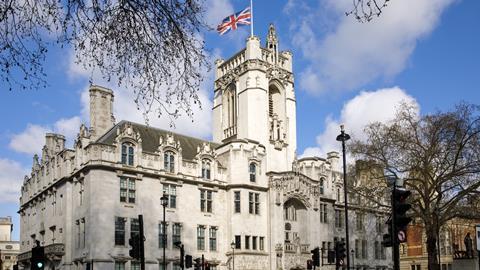The Supreme Court has ruled unanimously that two claims concerning Royal Bank of Scotland’s misselling of PPI were brought in time.
In Smith and another v Royal Bank of Scotland plc two former credit card-holders were sold payment protection insurance (PPI) policies by the bank, which received ‘very large undisclosed’ commissions.
Each claim was brought more than 10 years after the PPI policy ended and the last payment was made, but less than six years after the credit card agreement with the bank ended.
David Greene, senior partner of Edwin Coe and former president of the Law Society tweeted that the ruling was 'very important', stating: 'Supreme Court overturns decision of Court of Appeal on issue of limitation in consumer credit claims. SC decided that limitation period starts when credit relationship ends extending period possibly by many years.'
A district judge had allowed each claim, and both were successful in the subsequent appeal. The Court of Appeal, which heard the cases together, dismissed the claims on the ground that the time limit had expired before the proceedings began in 2019.
The two appellants – Karen Smith and Derek Burrell – appealed to the Supreme Court.
The 26-page judgment found ‘well over 50% of the money paid for PPI did not go to the insurer but was retained as commission by the bank’.
Lord Leggatt, with whom Lord Briggs, Lord Kitchin, and Lord Hamblen agreed, said: ‘The bank does not dispute that in each of the present cases its failure to disclose the commissions that it received made its relationship with the claimant arising out of the credit agreement (taken with the related PPI agreement) unfair to the claimant. The dispute is about when “the cause of action accrued”.’
The bank argued time began when each of the PPI premium payments was made which Smith and Burrell sought to recover.
The bank disclosed the fact it had received commission and that the amount had exceeded ‘by a clearly considerable though still undisclosed margin’ 50% of the sums paid for PPI cover when a ‘partial redress’ was offered to Smith, in February 2018, and Burrell, in December 2017, under an FCA scheme.
The ‘inequality of knowledge’ meant the relationship between the bank and customer was ‘unfair for the duration of that relationship’.
The judge added: ‘As the claimants did not know about the commissions, they could not reasonably have been expected to bring proceedings seeking an order for repayment.
‘I cannot accept…that the relationship between the bank and [taking the case of] Ms Smith ceased to be unfair to her in April 2006. Indeed, I think it plain that it did not.
‘The economic consequence that Ms Smith was financially worse off as a result of having paid PPI premiums which she would never have paid if the bank had disclosed the amount of its commission persisted throughout that period of around nine years.
‘Indeed, her loss was exacerbated because she did not have the use of the money during this period. The relationship was therefore still unfair to her at the time when it ended in 2015.’
The judgment found the Court of Appeal was ‘mistaken’ and ‘went down a blind alley’ in adopting the no unfairness argument.
It also found that the argument made by the bank based on the transitional provisions is without merit.
Lord Hodge concurred with the decision to reinstate the order made by the district judge in each case and acknowledged his ‘initial view [that the appeal should fail] was mistaken’.
He added: ‘The bank states that, if the relationship between the bank and the debtor continues, this interpretation exposes banks to continuing claims relating to PPI policies long after the PPI mis-selling scandal has become stale.
‘Notwithstanding that people have been aware of the PPI misselling and the provision of regulatory compensation for such mis-selling for many years, it is feared that a continuing relationship between the debtor and the bank would give a green light to a claim.
‘The answer to this concern, to my mind, lies in the discretion which Parliament has given the court in relation to the appropriate remedy, if any, which it chooses to give. If a debtor sits on his or her hands in knowledge of the relevant facts, it would be, as Lord Leggatt states, inconceivable that a court would think it just to make an order under section 140B of the 1974 Act. This is so, both during the currency of the relationship and in the six years after that relationship has ended.’
This article is now closed for comment.




























7 Readers' comments